Verona Arena
The Verona Arena (Italian: Arena di Verona [aˈrɛːna di veˈroːna, aˈreːna -]) is a Roman amphitheatre in Piazza Bra in Verona, Italy built in the first century. It is still in use today and is internationally famous for the large-scale opera performances given there. It is one of the best preserved ancient structures of its kind. In ancient times, the arena's capacity was nearly 30,000 people. The stage for concerts and opera performances decreases the available places to a maximum of 15,000. It will be used as the closing ceremony for the 2026 Winter Olympics in Milan and Cortina d'Ampezzo.
| Verona Arena | |
|---|---|
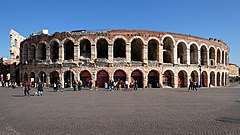 | |
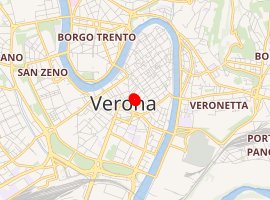
| |
| General information | |
| Type | Amphitheatre |
| Location | |
| Completed | 30 AD |
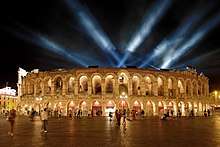
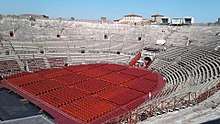
Amphitheatre
The building itself was built in AD 30 on a site which was then beyond the city walls. The ludi (shows and games) staged there were so famous that spectators came from many other places, often far away, to witness them. The amphitheatre could host more than 30,000 spectators in ancient times.
The round façade of the building was originally composed of white and pink limestone from Valpolicella, but after a major earthquake in 1117, which almost completely destroyed the structure's outer ring, except for the so-called "ala" (wing), the stone was quarried for re-use in other buildings. Nevertheless, it impressed medieval visitors to the city, one of whom considered it to have been a labyrinth, without ingress or egress.[1] Ciriaco d'Ancona was filled with admiration for the way it had been built and Giovanni Antonio Panteo's civic panegyric De laudibus veronae, 1483, remarked that it struck the viewer as a construction that was more than human.[2]
Opera venue
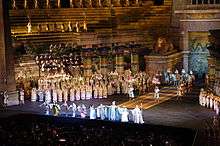
.jpg)
The first interventions to recover the arena's function as an opera venue began during the Renaissance. Some operatic performances were later mounted in the building during the 1850s, owing to its outstanding acoustics.
In 1913, operatic performances in the arena commenced in earnest due to the zeal and initiative of the Italian opera tenor Giovanni Zenatello and the impresario Ottone Rovato. The first 20th-century operatic production at the arena, a staging of Giuseppe Verdi's Aida, took place on 10 August of that year, to mark the birth of Verdi 100 years before in 1813. Musical luminaries such as Puccini and Mascagni were in attendance. Since then, summer seasons of opera have been mounted continually at the arena, except in 1915–18 and 1940–45, when Europe was convulsed in war.
In modern times, at least four productions (sometimes up to six) are mounted each year between June and August. During the winter months, the local opera and ballet companies perform at the Teatro Filarmonico.
Modern-day travellers are advised that admission tickets to sit on the arena's stone steps are much cheaper to buy than tickets giving access to the padded chairs available on lower levels. Candles are distributed to the audience and lit after sunset around the arena.
Every year over 500,000 people see productions of the popular operas in this arena.[3] Once capable of housing 20,000 patrons per performance (now limited to 15,000 because of safety reasons), the arena has featured many of world's most notable opera singers. In the post-World War II era, they have included Giuseppe Di Stefano, Maria Callas, Tito Gobbi and Renata Tebaldi among other names. A number of conductors have appeared there, too. The official arena shop has historical recordings made by some of them available for sale.
The opera productions in the Verona Arena had not used any microphones or loudspeakers until a sound reinforcement system was installed in 2011.[4]
Arena di Verona Festival
Arena di Verona Festival is a summer festival of opera, inaugurated in 1913 with Giuseppe Verdi's Aida, to celebrate the centenary of the artist's birth.
Other uses
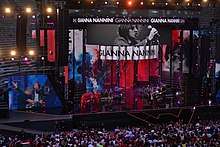
In recent times, the arena has also hosted several concerts of international rock and pop bands, among which Zucchero Fornaciari, who holds the record of the highest number of concerts in the location, 38 from 1989 to 2017, and the highest number of concerts during the same tour, 22 of the Black Cat World Tour, Roger Waters, Bruce Springsteen, Elisa, Eros Ramazzotti, Laura Pausini, Pink Floyd, Alicia Keys, One Direction, Simple Minds, Duran Duran, Deep Purple, The Who, Dire Straits, Mike Oldfield, Rod Stewart, Sting, Pearl Jam, Radiohead, Peter Gabriel, Björk, Muse, Leonard Cohen, Paul McCartney, Jamiroquai, Whitney Houston, Mumford & Sons, Kiss, Spandau Ballet, 5 Seconds Of Summer, 2Cellos and Evanescence.
In 1981, 1984, 2010 and 2019[5] it hosted the podium and presentation of the Giro d'Italia with thousands packing the arena to watch the prizes being handed out.
The 2011 Bollywood film Rockstar directed by Imtiaz Ali starring Ranbir Kapoor with music composed by Academy Award winner A. R. Rahman opens and closes with several concerts shot here.
On 24 September 2012 Leonard Cohen performed here as part of the First European Leg of his "Old Ideas" World Tour.
On 25 June 2013 Paul McCartney performed at the venue as part of his 2013 Tour.
British-Irish boy band One Direction performed on 19 May 2013 as part of their Take Me Home Tour.
Spandau Ballet played a concert at Verona Arena on 6 July 2015, as part of their Soul Boys Of The Western World Tour.
On 21 September 2015 the operatic pop group Il Volo performed in Verona for their final date of the Grande Amore Tour. The evening was recorded and broadcast by Rai1 and gained a share of 23%
On May 13th 2016, the Australian band 5 Seconds Of Summer performed in Verona as part of their 2016 Sounds Live Feels Live World Tour.
On May 28th and 29th 2016, the English singer Adele performed in Verona as part of her Adele Live 2016 Tour.
See also
References
- altum lambyrintum in quo nescitur ingressus et egressus, quoted in Roberto Weiss, The Renaissance Discovery of Classical Antiquity, 1969:117 and note 7.
- Weiss 1969.
- Festivals in Italy 2009
- "Verona Opera Festival Outfitted with New Audio". AVTechnology. February 7, 2011.
- http://www.giroditalia.it/it/tappa/tappa-21-2019/
External links
| Wikimedia Commons has media related to Arena di Verona. |
- Verona Arena website, in English
- Photographs of Arena di Verona
- An article on Arena di Verona including Photographs and videos
- Live webcam on Verona Arena
- Verona Arena English Video Introduction
| Preceded by Beijing National Stadium Beijing |
Winter Olympics Closing Ceremony 2026 |
Succeeded by TBA |